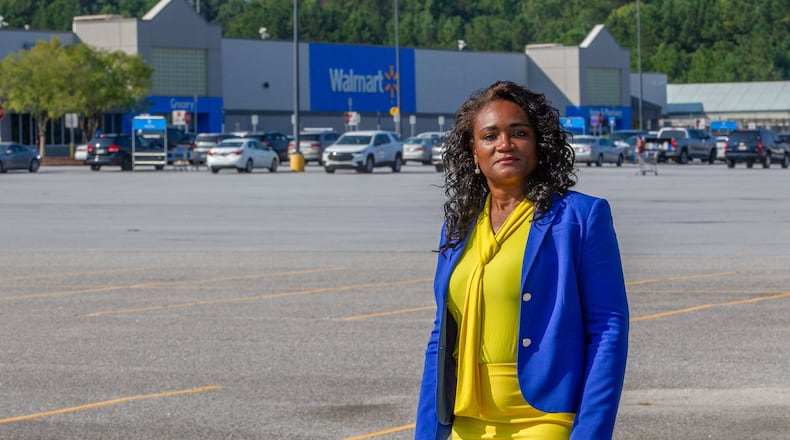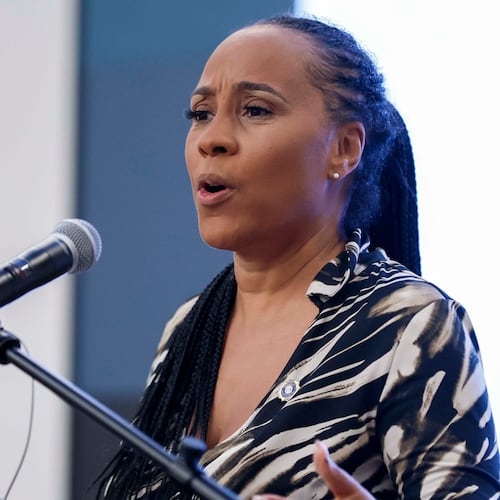Editor’s note: This story has been updated to reflect that state Rep. Donna McLeod lives in unincorporated Gwinnett County near the city limits of Lawrenceville.
A state representative is demanding answers about Lawrenceville’s installation and use of license plate-reading cameras in or near predominately Black neighborhoods.
State Rep. Donna McLeod, D-Lawrenceville, and her legislative team are filing an open records request for more information about the city’s 12 cameras. The legislator has pressed city officials for months about how the camera locations were chosen and whether they are targeting Black residents, but says she’s still dissatisfied with the answers.
McLeod has argued that the cameras are located in predominantly Black neighborhoods and that the current crime levels in these areas do not justify the placement of the cameras. As someone who lives near the city limits of Lawrenceville, she worries that the cameras unfairly target Black individuals.
“I’m not an outsider; I don’t see that crime,” said McLeod during a recorded virtual meeting with city officials. “I will not accept biased or racially motivated Flock cameras in our neighborhoods of color.”
Lawrenceville’s mayor said the cameras are intended to catch criminals, not to target any specific communities. He told The Atlanta Journal-Constitution that the crime levels in the areas do warrant the cameras.
“As I have stressed to Rep. McLeod, we are not looking to intentionally — or unintentionally — target any community,” said Mayor David Still. “We’re just trying to make Lawrenceville safe. (The cameras) help solve multiple crimes on a monthly basis.”
Credit: Steve Schaefer
Credit: Steve Schaefer
The cameras, made by Atlanta-based Flock Safety, capture the license plate, make, model and color of all passing vehicles. They notify officers if any of the tags are listed as stolen or connected with people wanted by police. The cameras are used by other departments across Gwinnett County and metro Atlanta.
“Say we had a homicide and the vehicle leaves,” said Police Chief Tim Wallis. “It can pick up the tag of that car as it’s leaving, which helps (detectives) and aids them with their investigation.”
Lawrenceville has operated the $24,000 cameras since September 2020. Locations include Paper Mill Road by Mulberry Place Apartments, Glenn Edge Drive by the Lawrenceville Housing Authority, thoroughfares near the Walmart on Collins Hill Road and a few near downtown, among others.
Credit: City of Lawrenceville
Credit: City of Lawrenceville
The Flock cameras produced 60 alerts to police as of July 25. In almost every case, officers made an arrest or issued warnings or citations, according to records provided to the AJC by the department.
The cameras in the Collins Hills Road and Hurricane Shoals Road area — cited by McLeod as being in predominately Black neighborhoods — accounted for 56% of all arrests attributed to the cameras over the past 10 months, according to the department.
Data on the race of people investigated as a result of the cameras was provided by the Lawrenceville Police Department, but was too incomplete to refute McLeod’s claim.
Of the 60 alerts the cameras produced, the race of the individuals involved was not listed in 24 instances, as police officers either couldn’t locate them or left their race out of the reports, Wallis said.
Of the 36 incidents that included a race, Black individuals accounted for about 65% of them, leading to arrests, warnings or citations, auto tag confiscations, or impounded vehicles.
Only about 34% of Lawrenceville’s 30,629 population identifies as Black, according to 2020 U.S. Census data.
Police Chief Tim Wallis said law enforcement placed the cameras near apartments and extended-stay hotels that had high rates of assault, theft and drug-related crimes. The locations were chosen based on predictive crime forecasts for a 12-month period, he said.
George Dorsey, who works on McLeod’s legislative team, said that the methodology of the predictive crime mapping could be flawed, and that may have resulted in the cameras being installed in places where crime is not a problem.
Wallis told The Atlanta Journal-Constitution that law enforcement used software to create the predictive crime forecast. The software took into account the location of calls to which officers responded but not crime encounters from patrols, he said.
“We were targeting crime,” Wallis said. “(The location of the cameras) had nothing to do with race or ethnicity.”
McLeod said she supports the use of cameras to catch criminals, but only if it’s done in a way that doesn’t target any specific communities. Installing the cameras along roadways with higher traffic counts “could be more neutral and unbiased,” Dorsey said.
Dorsey and McLeod are also concerned that the cameras could violate Fourth Amendment rights protecting citizens from unreasonable search and seizure if a Flock alert is inaccurate.
“I don’t think anything is 100% foolproof, and we’ve seen it happen,” said Wallis in response to the Fourth Amendment concerns. “... A lot of it has to do with your officers’ training and the way we go about handling our business each day.”
Lawrenceville plans to integrate Flock cameras into speed cameras going up within the next few months near school zones, Wallis said. Law enforcement will move the cameras to different locations if crime trends shift, Still said.
During the videoed August meeting, McLeod implored the city to take steps to be more transparent about their use of the cameras. She said that leadership failed to let people know that they exist, as she didn’t know about them until one of her constituents brought them to her attention.
The city has now published a “transparency” page on its website. The page includes information on how the cameras work, the number of arrests made from them and a map on the cameras’ locations.
“We want people to feel comfortable in being citizens here and enjoy living in Lawrenceville,” Still told McLeod during the recorded meeting. “We don’t want anybody to think that this isn’t their hometown.”
McLeod hopes the records she requested will shed light on who sat at the table when the decision was made to install the cameras.
The legislator and her colleague said they don’t think Lawrenceville’s officials intentionally targeted Black individuals. But the location of the cameras could lead to unintended consequences, Dorsey said.
“We expect leadership to be unbiased, to not racially profile and to not subject communities of color to harassment,” McLeod said.
About the Author
The Latest
Featured




